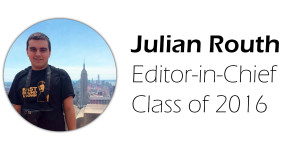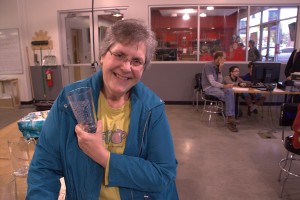Former Nabisco plant houses hub of innovation
Jennifer Kwiecien is working diligently at a machine that requires both a steady hand and creative mind.
If it was 1964, she would be using a drill press in an industrial factory to make cookies and snacks for Nabisco.
But a half a century later, she is computing vector numbers into a laser cutter, which stamps an intricate design onto a glass cup.
“I’m 57 years old. I spent the last 35 years working: 15 in analytical chemistry and 20 in IT,” she says with a smile. “I’m tired of working. I want to learn the stuff I never had time to learn.”
Kwiecien, of Carnegie, isn’t a factory worker, but a member at TechShop Pittsburgh, a community-based technology workshop in Bakery Square.
On the outskirts of East Liberty, Bakery Square has evolved from a gritty Nabisco factory to a hub of technological and cultural innovation in just five years, doing so through the undeterred will of a real estate company and its tenants, including one of the most influential corporations in the world.
Built in 1918, the Nabisco plant occupied the space for nearly 80 years before closing in 1998 as part of a “broad restructuring program designed to cut costs and increase spending on advertising,” according to a 1998 Pittsburgh Post-Gazette article.
A year later, the plant was turned over by the Regional Industrial Development Corporation to the Bake-Line Group, which had to sell the property in early 2004 after declaring bankruptcy.
That made way for Walnut Capital, a Pittsburgh real estate development company that was in need of a shift in focus. The group wanted to put more money into the East Side and less into Downtown, Walnut principal and CEO Gregg Perelman remembers. With Bakery Square, the opportunity was there.
“We wanted to have an opportunity to do a lifestyle center that had office, retail and housing,” Perelman says. “And we wanted to be able to take an old facility and bring life back into it. To be honest, it all started with the revitalization of East Liberty.”
If it were a few years earlier, Walnut may have been hesitant to build in East Liberty, but a wave of retail openings less than one mile from the site in the early 2000’s made the neighborhood more appealing to developers and consumers. With the addition of Home Depot in 2000 and Whole Foods in 2002, East Liberty and the East End were finally coming together after a decade of near collapse.
After purchasing the property for $5.4 million, Walnut began construction in 2007 with a single vision: “Build it right and they will come.”
“That’s really what drove this development,” Walnut president Todd Reidbord recalled at a press conference for new construction in April 2014. “Building it right meant carefully putting the pieces of a quality-of-life mixed-use development together. That included building innovative urban office space with an industrial feel.”
Walnut was right; they did come. Several high-tech companies flocked to the new development, including the UPMC Technology Development Center, Carnegie Mellon University Software Engineering Institute and Google, which formerly housed its offices in a much smaller space at CMU.
“[Google] wanted to be in a cool space close to Pittsburgh’s universities,” Perelman says. “A lot of the times, universities don’t have room on campus to house some of these companies.”
The proximity to university labs, especially those at CMU and the University of Pittsburgh, created a culture of innovation at Bakery Square, Perelman says. This was during the same time that Pittsburgh was experiencing a cultural renaissance of its own, evolving from an industrial steel town with smokestacks and smelters to a technological hub with esteemed engineering talent.
Google noticed so much potential in Pittsburgh and Bakery Square that it nearly tripled its occupancy to 115,000 square feet in 2011, a year after opening its doors.
To give Bakery Square more of a campus feel for Google workers and other employees, Walnut launched Bakery Square 2.0, a project that features 400,000 square feet of new office space, more than 90 townhomes and 450 apartments across from Penn Avenue on the site of the former Reizenstein Middle School. Officials broke ground in April and are almost finished with construction.
“Bakery Square 2.0 gives our tenants a home neighborhood to do everything in,” Perelman says.
But Bakery Square isn’t only for Google workers and cutting-edge engineers. It’s also for people like Kwiecien who are looking for new things to experience in Pittsburgh, and new places to shop and eat.
For the shopping fanatic, there’s Anthropologie – a women’s apparel and accessory shop – and Learning Express Toys – a specialty toy store. For the hungry, there’s Social, a hip restaurant and bar that has as many beer specials as it has menu items.
And of course there’s TechShop Pittsburgh, where Kwiecien can learn what laser cutting is and how to operate a $250,000 Waterjet.
“It’s about time I pursue my creative endeavors,” Kwiecien says, lifting up her glass cup with pride.
From TechShop to Google, creativity is encouraged at Bakery Square. Now that the crumbs of Nabisco crackers have long blown away, the small square in East Liberty is poised to create big things.


 Next Post
Next Post